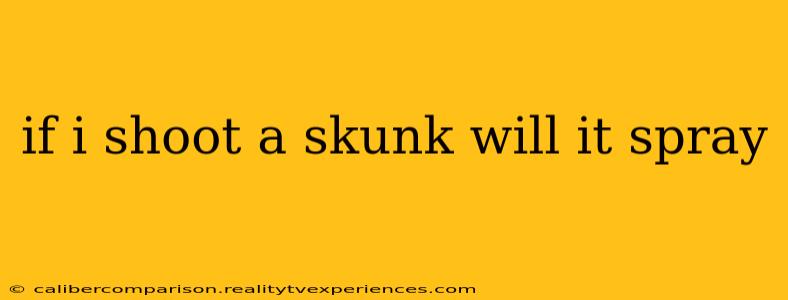The short answer is: yes, very likely. Shooting a skunk is incredibly risky and almost guarantees you'll be on the receiving end of its infamous spray. While you might think a dead skunk can't spray, that's a dangerous misconception. Here's why:
The Skunk's Powerful Defense Mechanism
Skunks don't spray out of aggression; it's a powerful defense mechanism. The spray is a potent mixture of thiols, which creates that unmistakable, pungent odor. The musky smell is so strong that it can linger for weeks and even cause temporary blindness or nausea.
Crucially, the spray mechanism is reflexive. This means the muscles that control the spray glands can still function even after the skunk's death, often for several minutes after. The shock of being shot, even fatally, can trigger this reflexive action, resulting in an unwanted and unpleasant shower of skunk spray.
Beyond the Immediate Spray: Other Risks
Shooting a skunk presents a multitude of problems beyond just the potential for being sprayed:
Health Risks:
- Rabies: While not all skunks carry rabies, it's a significant risk. Handling a potentially rabid animal, even a dead one, is dangerous.
- Disease Transmission: Besides rabies, skunks can carry other diseases that could be transmitted through their bodily fluids or contact with their carcasses.
- Toxic Spray: As mentioned before, the spray itself is irritating to the eyes and mucous membranes and can cause nausea. Even a post-mortem spray can cause these symptoms.
Legal Ramifications:
- Wildlife Protection Laws: Many areas have laws protecting skunks and other wildlife. Shooting a skunk without a permit is likely illegal and could result in fines or other penalties.
- Ethical Considerations: Shooting an animal as a first resort to dealing with a nuisance is ethically questionable. There are more humane and effective ways to deter skunks from your property.
Ineffective Solution:
- Spray Persistence: Even if you successfully kill the skunk, the lingering smell from its spray will still be a major problem, making cleaning and removing the odor a considerable challenge. This lingering odor can affect your property value and can be extremely difficult to remove.
Humane and Effective Alternatives
Instead of resorting to violence, consider these safer and more ethical options for dealing with skunks:
- Deterrents: Motion-activated sprinklers, strong-smelling deterrents (like ammonia), and securing garbage cans can effectively discourage skunks from entering your property.
- Professional Wildlife Removal: Contacting a local wildlife removal service is the best way to humanely relocate a skunk. They have the expertise and tools to handle the situation safely and effectively.
Conclusion: Avoid Shooting Skunks
Shooting a skunk is a highly risky, potentially illegal, and ultimately ineffective solution to a skunk problem. The likelihood of getting sprayed, even after the skunk is dead, is very high. Prioritize humane and effective alternatives to protect yourself, the skunk, and the environment. Your safety and the well-being of wildlife are paramount.

